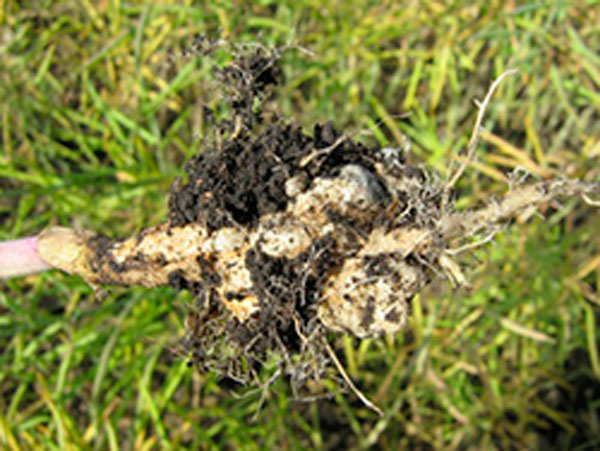
The provincial government, with the help of SaskCanola, is providing 850 kits for producers to test for clubroot—a soil borne disease that can cause premature death in cruciferous crops and vegetables.
According to their website, these include mustard, oilseed radish, brussel sprouts and cabbage.
But crops extension specialist based in Prince Albert, Allie Noble, said canola producers should be especially scouting for clubroot. Farmers can pick up one of 70 tests available in the regional office in the McIntosh Mall.
Reporting positive tests will help the Ministry of Agriculture with this year’s clubroot survey. Last year, when they focused testing in northern Saskatchewan, 43 producers reported their crops tested positive for the disease.
“Clubroot can be seen as a bit of a scary thing for producers, but it is really important that they do report and that’s just because when we do get those reports in, that means that our map is a lot more accurate,” said Noble. “That’ll definitely help with research that goes towards clubroot and funding, so it can really benefit a producer to report these findings.”
This year’s survey will cover most on Saskatchewan, but focus on the south, added Noble. The province is covering 600 fields in the north and 1,200 fields in the southern part of the province.
They will conduct heavy grid sampling based on the risk of those 1,200 fields, while other areas will have tests done in one or two fields per rural municipality.
Since the disease moves with the soil, Noble said testing for it can be tricky. A negative test doesn’t mean clubroot isn’t in the crop, it might mean you’re testing in the wrong spot.
“Prevention is key here,” she emphasized. “Any way that we can limit the spread of clubroot and the amount of spores building up in the soil is a win for us.”
She said the best way for producers to prevent it is by keeping an eye on your crops, even if that means pulling out the plant to check its roots.
But the good news, said Noble, is that she’s finding producers are becoming more aware of clubroot and its consequences.
“It’s the awareness factor in that people are scouting for it, which makes me really happy that (they’re) just more aware and understanding that it could affect their operation.”
‘Big bad of canola:’ Flea beetle population higher than normal
A Saskatoon entomologist is warning farmers of another harm to canola crops: flea beetles.
Agriculture and Agri-Food Canada’s Tyler Wist said the population of these damaging insects is higher this year than in the past. He referred to flea beetles as the “big bad of canola.”
Wist explained that they flourish in hot and dry conditions, which could be why there’s such a large number of the beetles this year. He finds winter conditions don’t have an impact.
“They tend to overwhelm the crops. The beneficial insects that might control them, they get overwhelmed as well just by the sheer number of these flea beetles,” he said.
The two types of flea beetles, crucifer and striped, feed on the crop when it’s young.
Green lacewing larvae can eat 30 aphids a day, but aren’t currently able to control the high population of flea beetles. When Wist described the appearance of the larvae—which is in its name—he joked that entomologists aren’t exactly the most creative people.
Although flea beetles are posing a risk to canola, Wist has found them in other crops as well.
“We found the crucifer flea beetle feeding in my quinoa plots. It was also feeding on Lamb’s Quarters, so that crop, quinoa and Lamb’s Quarters are in the same genus. They will feed on a lot of your mustards as well,” he said. “If you’ve got something in your garden like cabbage or broccoli, cauliflower, they’ll love feeding on that too.”
Wist said to use an insecticide to kill the beetles right when they start feeding.

